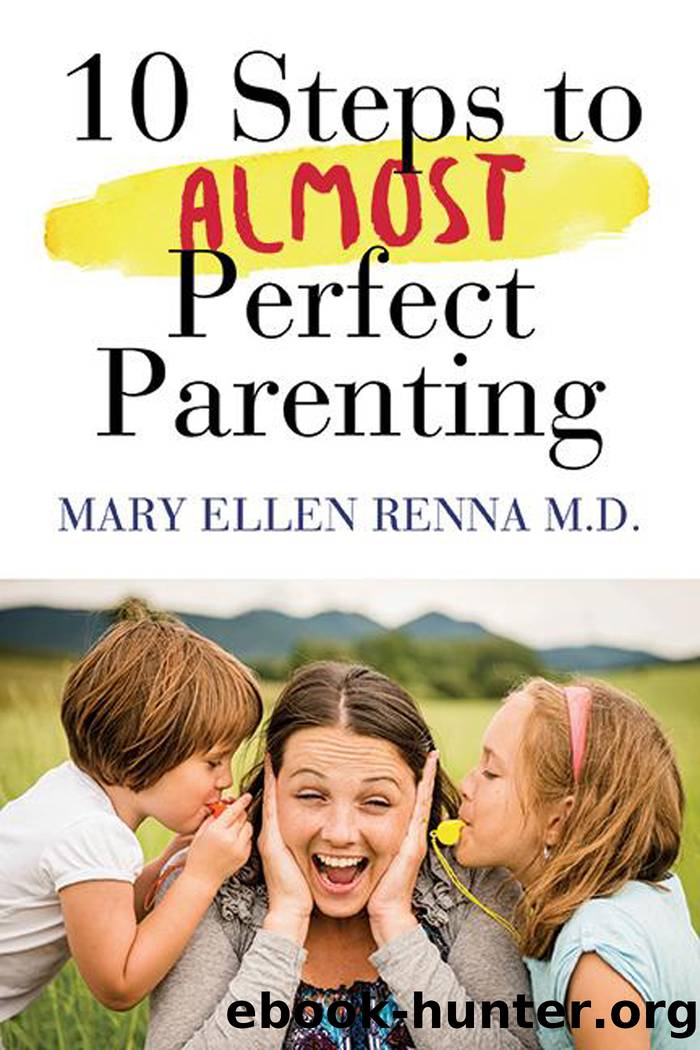10 Steps to Almost Perfect Parenting! by Mary Ellen Renna M.D

Author:Mary Ellen Renna M.D.
Language: eng
Format: epub
ISBN: 9781590793367
Publisher: SelectBooks
Published: 2018-11-16T00:00:00+00:00
Step 5
Become a Teacher
A teacher effects eternity. He can never tell where his influence stops.
Henry Adams
A US historian, journalist, novelist, and educator, the grandson of John Quincy Adams and great-grandson of John Adams
You are your childâs most important teacher
Take the time to give your child explanations
Find teachable moments throughout the day
Learn with your child
This might seem like an obvious statement, but you may be surprised to learn that many parents donât understand their job as a parent includes being a teacher. This does not mean that the parent is standing in front of the whiteboard or the computer screen and doing physics problems, and this does not even mean teaching your child to learn letters. This is about teaching the most important skills of allâlife skills. These include how to handle disappointment, figure out problems, deal with difficult people, and be a kind and caring person. These teachings happen each and every day in a parentâs lifetime, and many are not even aware that they are happening.
This chapter is designed to give you a glimpse into understanding your parental role as teacher. Hopefully you will also enjoy being open to learning new things with your child, even if it means you have to look up the answer to a query like âWhy does the sky look blue?â
Each parent faces a different challenge in order to fulfill their teaching role, since some children are less apt to learn than others. It is the combination of the skills of the parent and the learning style of the baby that will determine how easily success will come.
Letâs start from the beginning. When babies are born, they are ruled by their brainstem; they are mainly reflexes. The theory of tabula rasa describes the newborn coming into the world as a complete blank slate only acquiring knowledge through experience. It is these experiences that shape the individual. There is no arguing that experiences have a profound impact on the type of adult he or she will become, but there is a much larger piece to this simplistic view of lifeâthe old nature versus nurture theory is at work. Which one is correct? Does each baby grow up to be an adult that is purely the result of the sum of their life events as they are molded into the adult a parent wants? Or does the baby have a preset destiny determined long before birth as the DNA was intertwined into the babyâs genetic code? The answer is no surprise as they both influence the development of an adult. The crux here is to put the nurture portion of the old argument to good use and potentially change the genetic destiny.
The cortex or thinking part of the brain has not fully developed at birth, but indeed it rapidly progresses, as a parent will obviously note their babyâs first smile in response to a human face shortly after birth. That is their cortex doing the talking! The previously reflexive baby is now a thinking little being in a few short weeks.
Download
This site does not store any files on its server. We only index and link to content provided by other sites. Please contact the content providers to delete copyright contents if any and email us, we'll remove relevant links or contents immediately.
Doing It: Let's Talk About Sex... by Hannah Witton(9266)
Thirteen Reasons Why by Jay Asher(8873)
The Girl Without a Voice by Casey Watson(7869)
The Incest Diary by Anonymous(7661)
Should I Stay or Should I Go? by Ramani Durvasula(7639)
The Lost Art of Listening by Michael P. Nichols(7475)
The Leavers by Lisa Ko(6941)
The Space Between by Michelle L. Teichman(6911)
The Testaments by Margaret Atwood(6864)
The Four Agreements by Don Miguel Ruiz(6728)
Rich Dad Poor Dad by Robert T. Kiyosaki(6574)
The Rosie Project by Graeme Simsion(6348)
Beartown by Fredrik Backman(5708)
We Need to Talk by Celeste Headlee(5594)
Ego Is the Enemy by Ryan Holiday(5390)
Men In Love by Nancy Friday(5218)
Spare by Prince Harry The Duke of Sussex(5164)
Hunger by Roxane Gay(4909)
Suicide Notes by Michael Thomas Ford(4807)
